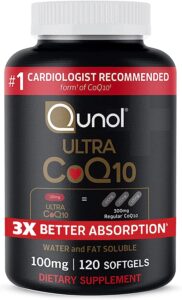Coenzyme Q10, also known as CoQ10, is a naturally occurring compound found in every cell of the human body. It plays a crucial role in the production of energy and acts as a powerful antioxidant. In recent years, CoQ10 has gained popularity as a dietary supplement due to its potential health benefits. However, like any other supplement, it is important to understand both the benefits and potential side effects before incorporating it into your routine.
One of the most well-known benefits of CoQ10 is its ability to support heart health. Research suggests that CoQ10 may help reduce blood pressure and improve overall cardiovascular function. It has been shown to enhance the production of ATP, the primary source of energy for the heart muscle. Additionally, CoQ10 acts as an antioxidant, protecting the heart from oxidative stress and inflammation. These properties make it a promising supplement for individuals with heart conditions or those looking to maintain a healthy heart.
Another potential benefit of CoQ10 is its role in supporting brain health. As we age, the production of CoQ10 in our bodies naturally declines. This decline has been linked to age-related cognitive decline and neurodegenerative diseases such as Alzheimer’s and Parkinson’s. Some studies suggest that CoQ10 supplementation may help slow down the progression of these diseases and improve cognitive function. However, more research is needed to fully understand the extent of CoQ10’s impact on brain health.
In addition to its cardiovascular and neurological benefits, CoQ10 has also been studied for its potential role in improving fertility. Research has shown that CoQ10 supplementation may improve sperm quality and motility in men, making it a potential treatment for male infertility. In women, CoQ10 has been found to enhance egg quality and increase the chances of successful pregnancy. These findings have led to the use of CoQ10 as a supplement for couples undergoing fertility treatments.
While CoQ10 offers several potential health benefits, it is important to be aware of its potential side effects. In general, CoQ10 is considered safe and well-tolerated when taken in recommended doses. However, some individuals may experience mild side effects such as nausea, diarrhea, or stomach upset. These side effects are usually temporary and subside on their own. It is always advisable to consult with a healthcare professional before starting any new supplement, especially if you have any underlying medical conditions or are taking other medications.
It is worth noting that CoQ10 supplements may interact with certain medications, including blood thinners and chemotherapy drugs. If you are taking any prescription medications, it is crucial to discuss the use of CoQ10 with your healthcare provider to avoid any potential interactions or adverse effects.
In conclusion, Coenzyme Q10 is a natural compound with potential health benefits. It may support heart health, brain function, and fertility. However, it is important to be aware of potential side effects and consult with a healthcare professional before starting any new supplement. As with any dietary supplement, it is always best to prioritize a balanced diet and a healthy lifestyle as the foundation for overall well-being.
Understanding the Positive Effects of CoQ10: A Comprehensive Review
Coenzyme Q10, also known as CoQ10, is a naturally occurring compound found in every cell of the human body. It plays a crucial role in the production of energy and acts as a powerful antioxidant. In recent years, CoQ10 has gained popularity as a dietary supplement due to its potential health benefits. However, like any other supplement, it is important to understand both the positive effects and potential side effects of CoQ10.
One of the main benefits of CoQ10 is its role in energy production. It is a key component of the electron transport chain, which is responsible for generating adenosine triphosphate (ATP), the molecule that provides energy to the cells. As we age, the levels of CoQ10 in our bodies naturally decline, leading to a decrease in energy production. Supplementing with CoQ10 can help replenish these levels and boost energy levels, making it particularly beneficial for individuals with fatigue or low energy.
Another positive effect of CoQ10 is its antioxidant properties. It helps neutralize harmful free radicals, which are unstable molecules that can damage cells and contribute to aging and various diseases. By reducing oxidative stress, CoQ10 may help protect against chronic conditions such as heart disease, diabetes, and neurodegenerative disorders like Parkinson’s and Alzheimer’s disease.
CoQ10 has also been studied for its potential benefits in heart health. It is involved in the production of ATP, which is essential for the proper functioning of the heart muscle. Several studies have shown that CoQ10 supplementation can improve symptoms in individuals with heart failure, reduce blood pressure, and improve overall heart function. It may also help lower LDL cholesterol levels and increase HDL cholesterol, which are important markers of cardiovascular health.
In addition to its positive effects, it is important to be aware of the potential side effects of CoQ10. While it is generally considered safe for most people, some individuals may experience mild gastrointestinal symptoms such as nausea, diarrhea, or stomach upset. These side effects are usually temporary and can be minimized by taking CoQ10 with food. However, individuals with existing medical conditions or those taking certain medications should consult with their healthcare provider before starting CoQ10 supplementation, as it may interact with certain drugs.
Furthermore, it is worth noting that CoQ10 supplements are available in two forms: ubiquinone and ubiquinol. Ubiquinone is the oxidized form of CoQ10, while ubiquinol is the reduced form. Both forms are effective, but some studies suggest that ubiquinol may be more readily absorbed by the body. However, ubiquinol supplements tend to be more expensive than ubiquinone, so it is important to consider personal preferences and budget when choosing a CoQ10 supplement.
In conclusion, Coenzyme Q10, or CoQ10, offers several potential health benefits. It plays a crucial role in energy production, acts as a powerful antioxidant, and may improve heart health. However, it is important to be aware of potential side effects and consult with a healthcare provider before starting CoQ10 supplementation. By understanding both the positive effects and potential risks, individuals can make informed decisions about incorporating CoQ10 into their daily routine.
Coenzyme Q10 Side Effects: What You Need to Know
Coenzyme Q10, also known as CoQ10, is a naturally occurring compound found in every cell of our body. It plays a crucial role in the production of energy and acts as a powerful antioxidant. Due to its potential health benefits, CoQ10 has gained popularity as a dietary supplement. However, like any other supplement, it is important to be aware of its potential side effects.
One of the most common side effects of CoQ10 is gastrointestinal discomfort. Some individuals may experience symptoms such as nausea, diarrhea, or stomach upset. These side effects are usually mild and temporary, but if they persist or worsen, it is advisable to consult a healthcare professional.
Another potential side effect of CoQ10 is a decrease in blood pressure. This can be beneficial for individuals with high blood pressure, as it may help to lower their readings. However, for those with normal or low blood pressure, this decrease can be problematic. It is important to monitor blood pressure levels regularly and adjust the dosage of CoQ10 accordingly.
In rare cases, CoQ10 supplementation has been associated with allergic reactions. Symptoms may include rash, itching, swelling, or difficulty breathing. If any of these symptoms occur, it is crucial to seek immediate medical attention.
It is worth noting that CoQ10 may interact with certain medications. For example, it can reduce the effectiveness of blood-thinning medications such as warfarin. It is important to inform your healthcare provider about any supplements you are taking to avoid potential drug interactions.
Despite these potential side effects, CoQ10 offers numerous health benefits. One of its primary benefits is its role in energy production. CoQ10 is involved in the production of adenosine triphosphate (ATP), which is the primary source of energy for our cells. By increasing ATP production, CoQ10 can enhance overall energy levels and improve physical performance.
CoQ10 is also a powerful antioxidant, which means it helps to neutralize harmful free radicals in the body. Free radicals are unstable molecules that can cause damage to cells and contribute to the aging process. By reducing oxidative stress, CoQ10 may help to protect against chronic diseases such as heart disease, cancer, and neurodegenerative disorders.
Furthermore, CoQ10 has been shown to have a positive impact on heart health. It can help to improve cardiovascular function, reduce inflammation, and lower blood pressure. Some studies have even suggested that CoQ10 supplementation may be beneficial for individuals with heart failure or those recovering from a heart attack.
In addition to its cardiovascular benefits, CoQ10 has been studied for its potential role in fertility and reproductive health. It has been found to improve sperm quality and motility in men, and may also enhance egg quality in women undergoing fertility treatments.
In conclusion, Coenzyme Q10 offers numerous health benefits, including increased energy production, antioxidant protection, and improved heart health. However, it is important to be aware of potential side effects such as gastrointestinal discomfort, decreased blood pressure, allergic reactions, and drug interactions. As with any supplement, it is advisable to consult a healthcare professional before starting CoQ10 supplementation, especially if you have any underlying medical conditions or are taking medications.
We recomend Qunol CoQ10 100mg Softgels, Ultra CoQ10 100mg:
- 3X BETTER ABSORPTION THAN REGULAR CoQ10: Clinical trials have proven that no other CoQ10 supplement absorbs better than Qunol. In fact, Qunol Ultra absorbs 3X better than regular CoQ10
- #1 CARDIOLOGIST RECOMMENDED FORM OF COQ10: With superior absorption compared to regular CoQ10, Qunol 100mg CoQ10 softgel capsules can help you reach optimal levels of Coenzyme Q10 sooner, so you can experience the potential benefits faster
- 100% WATER AND FAT-SOLUBLE: Qunol CoQ10’s patented formulation is 100% water and fat-soluble, unlike regular CoQ10 that does not dissolve in water and dissolves very poorly in fat
- ESSENTIAL FOR ENERGY PRODUCTION: CoQ10 plays a vital role in the production of energy in the body. Taking a CoQ10 supplement helps increase natural CoQ10 levels that can be depleted by age and medications
You can buy it here.









